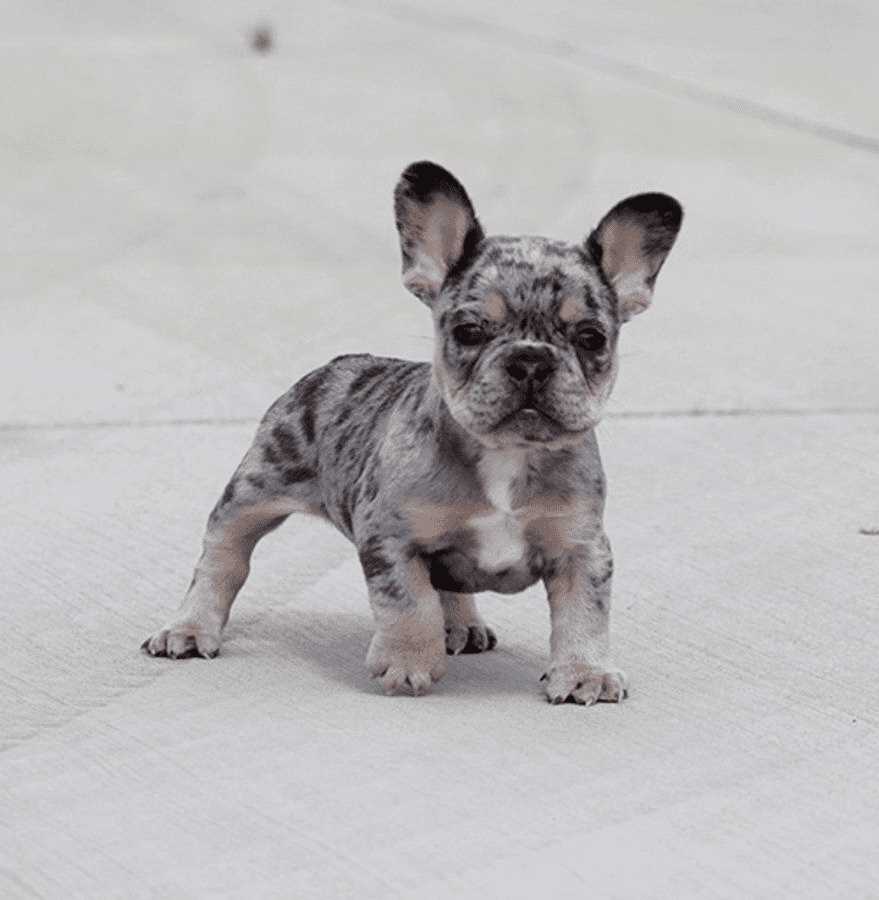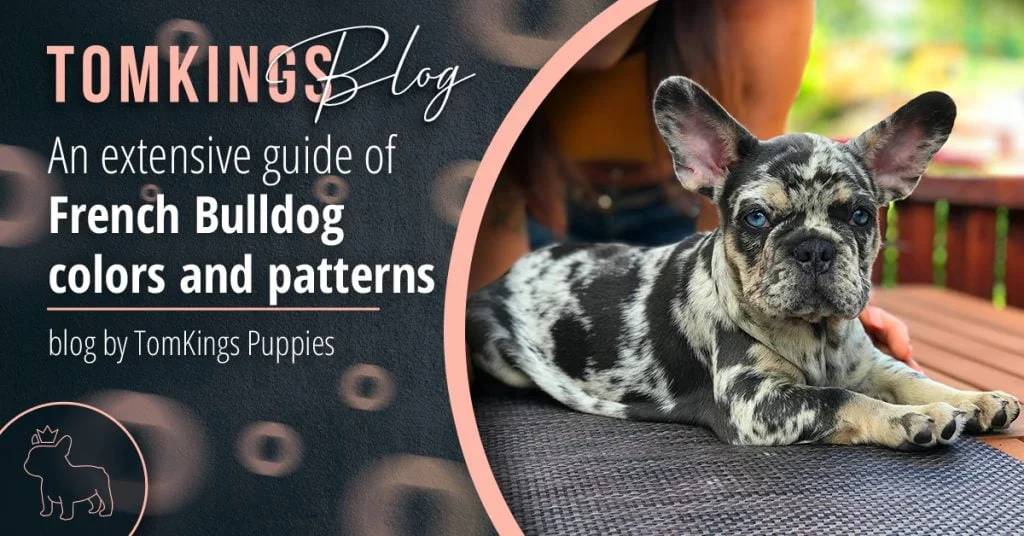
The French Bulldog is a beloved breed known for its compact size, playful personality, and distinctive bat-like ears. While the breed typically comes in a variety of colors, one of the rarest and most sought-after color variations is the black merle French Bulldog. This unique coat color is the result of a fascinating genetic mutation that has captured the attention of dog enthusiasts around the world.
It’s important to note that the black merle French Bulldog is considered a rare color variation and is not recognized by all kennel clubs. This is because the merle gene can also carry health risks, such as hearing and vision problems, when present in certain combinations. Responsible breeders take great care to ensure the health and well-being of their black merle French Bulldogs, and potential owners should be aware of these potential risks before bringing one into their home.
Despite the controversy surrounding the black merle French Bulldog, there is no denying the undeniable allure of this unique coat color. With its striking appearance and playful personality, the black merle French Bulldog continues to capture the hearts of dog lovers everywhere. Whether you’re a fan of the breed or simply intrigued by the genetics behind this rare color gene, there’s no denying the beauty and charm of the black merle French Bulldog.
The Bulldog Coat Color Genetics

The coat color of a French Bulldog is determined by its genetics. The Bulldog breed has a wide range of coat colors, including black, fawn, brindle, pied, and more. These colors are the result of various genes that interact to produce different pigments and patterns.
One of the main genes responsible for coat color in French Bulldogs is the E locus gene. This gene has two alleles: E and e. The E allele is dominant and produces a normal pigmentation, while the e allele is recessive and can cause a dilution of the coat color.
Another important gene is the K locus gene, which determines whether a French Bulldog will have a solid coat color or a pattern such as brindle or pied. The K locus gene has two alleles: K and k. The K allele is dominant and produces a solid coat color, while the k allele is recessive and allows the expression of brindle or pied patterns.
In addition to these genes, there are other genes that can modify the coat color of a French Bulldog. For example, the D locus gene determines whether a French Bulldog will have a dilute coat color, such as blue or lilac. The S locus gene determines the amount of white spotting on a French Bulldog’s coat, ranging from solid to heavily pied.
Coat Color Combinations

By combining different alleles of the coat color genes, a wide variety of coat color combinations can be produced in French Bulldogs. For example:
| Genotype | Coat Color |
|---|---|
| EE | Black |
| ee | Dilute (blue, lilac) |
| KK | Solid |
| kk | Brindle or pied |
| DD | Non-dilute |
| dd | Dilute |
| SS | No white spotting |
| Ss | Minimal to moderate white spotting |
| ss | Heavily pied |
These are just a few examples of the many possible coat color combinations in French Bulldogs. The genetics of coat color can be quite complex, and breeders need to carefully consider the potential outcomes when planning a breeding program.
What is the Merle Color Gene?
The merle color gene is a genetic mutation that affects the coat color pattern in dogs. It is responsible for creating a marbled or dappled effect on the dog’s coat, with patches of lighter and darker colors. The merle gene can be found in various dog breeds, including the French Bulldog.
Merle is a dominant gene, which means that if a dog inherits one copy of the gene from either parent, it will show the merle pattern. However, if a dog inherits two copies of the gene, it can lead to health issues such as blindness, deafness, and other neurological problems. Therefore, responsible breeders avoid breeding two merle dogs together to prevent these health risks.
How does the Merle Color Gene work?
The merle color gene works by affecting the distribution of pigment in the dog’s coat. Normally, pigment is evenly distributed throughout the coat, resulting in a solid color. However, the merle gene disrupts this distribution, causing patches of diluted pigment. This creates the characteristic marbled or dappled pattern seen in merle dogs.
The merle gene also affects the color of the dog’s eyes and nose. Dogs with the merle gene often have blue or partially blue eyes, and their noses may be partially or completely pink. This is due to the lack of pigment in these areas.
Merle French Bulldogs
Black merle French Bulldogs are a rare and highly sought-after color variation of the breed. Their coats display a beautiful combination of black and lighter shades, creating a striking and unique appearance. The merle gene adds an element of rarity and attractiveness to these already adorable dogs.
It is important to note that while black merle French Bulldogs are visually stunning, responsible breeding practices should always be followed to ensure the health and well-being of the dogs. Breeders should avoid breeding two merle French Bulldogs together to prevent the potential health issues associated with double merle breeding.
Black Merle French Bulldogs: Rarity and Attractiveness
Black Merle French Bulldogs are highly sought after due to their rarity and unique coat color. The Merle color gene, which is responsible for the distinctive coat pattern, is not commonly found in French Bulldogs. This makes black merles stand out from the typical coat colors of French Bulldogs, such as fawn, brindle, and pied.
The black merle coat color is characterized by a dark base color with patches or streaks of lighter colors, such as silver, blue, or gray. The combination of these colors creates a striking and eye-catching appearance that many dog enthusiasts find attractive.
Rarity

Black merles are considered rare in the French Bulldog breed due to the genetics involved. The Merle gene is a dominant gene, but it can also cause health issues when present in double copies. Breeders need to carefully select and breed dogs with the Merle gene to ensure the health and well-being of the puppies.
Due to the rarity of the black merle coat color, these French Bulldogs often come with a higher price tag compared to other coat colors. The demand for black merles is high among dog lovers and breed enthusiasts, further contributing to their rarity.
Attractiveness
Black merle French Bulldogs are undeniably attractive due to their unique coat color. The combination of the dark base color with the lighter patches or streaks creates a visually striking contrast that is hard to ignore.
Many people are drawn to the beauty and individuality of black merles, making them a popular choice for those looking for a unique and eye-catching pet. The distinct coat pattern of black merle French Bulldogs sets them apart from other French Bulldogs, making them stand out in a crowd.
Aside from their striking appearance, black merle French Bulldogs also possess the same lovable and affectionate temperament that is characteristic of the breed. They make excellent companions and family pets, providing endless love and entertainment to their owners.
Caring for a Black Merle French Bulldog

Taking care of a Black Merle French Bulldog requires special attention and care due to their unique coat color and potential health issues. Here are some important tips to consider:
- Grooming: Regular grooming is essential for a Black Merle French Bulldog. Their coat requires brushing at least once a week to remove any loose hair and prevent matting. Additionally, regular bathing is necessary to keep their coat clean and healthy.
- Sun Protection: Black Merle French Bulldogs are more susceptible to sunburn due to their lighter skin pigmentation. It is important to provide them with adequate sun protection, especially during hot summer months. Applying pet-safe sunscreen and providing shade can help prevent sunburn and potential skin issues.
- Exercise: Like all French Bulldogs, Black Merle French Bulldogs are prone to obesity. Regular exercise is crucial to maintain a healthy weight and prevent joint problems. Daily walks, playtime, and mental stimulation activities are recommended to keep them active and engaged.
- Health Monitoring: Black Merle French Bulldogs are more prone to certain health issues, including hearing and vision problems, as well as skin allergies. Regular veterinary check-ups and monitoring their overall health is important to detect any potential issues early on and provide appropriate treatment.
- Diet: Providing a balanced and nutritious diet is essential for the overall well-being of a Black Merle French Bulldog. It is important to feed them high-quality dog food that is suitable for their age, size, and specific dietary needs. Avoid overfeeding and consult with a veterinarian for proper feeding guidelines.
- Socialization: Black Merle French Bulldogs, like all French Bulldogs, thrive on human companionship. It is important to provide them with ample socialization opportunities from an early age. This includes exposing them to different people, animals, and environments to ensure they grow up to be well-rounded and confident dogs.
By following these tips, you can provide the best care for your Black Merle French Bulldog and ensure they live a happy and healthy life.

Tyler Newsom, a canine enthusiast, is passionate about bulldogs and their coat care. With years of experience and dedication, he shares his expertise to help bulldog owners maintain their beloved pets’ fur health and vitality through practical tips and advice.
